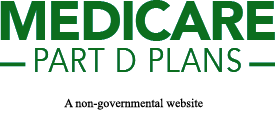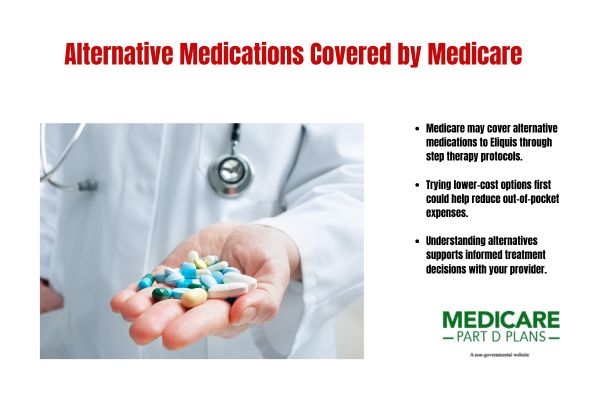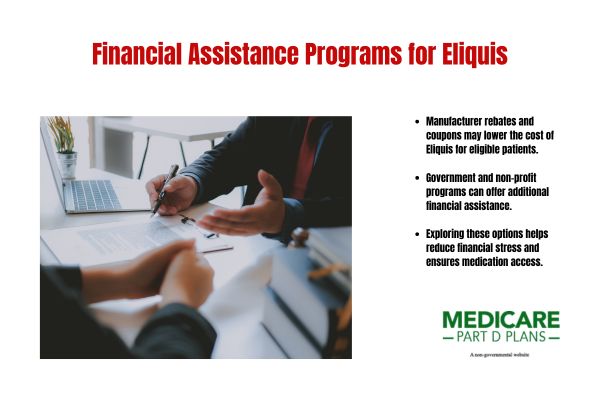Find a Medicare Part D prescription drug plan

Medicare Part D
Prescription Drug Coverage 2026
Does Medicare Part D Cover Eliquis?
Yes, Medicare Part D covers Eliquis. However, the specifics of coverage may vary based on your plan. This article will outline how Medicare Part D and Medicare Advantage plans might cover Eliquis, the related costs, and how to navigate coverage rules like prior authorization and step therapy.
Key Takeaways
- Eliquis will likely be covered under Medicare Part D and Medicare Advantage plans, but coverage specifics might vary by plan.
- Costs for Eliquis, such as monthly copayments and annual deductibles, may differ based on the plan’s formulary and any prior authorization or step therapy requirements.
- Financial assistance programs and manufacturer rebates will likely be available to help Medicare beneficiaries manage the high costs of Eliquis.
Eliquis Coverage Under Medicare Part D
Yes, Medicare will likely cover Eliquis, but the type of plan you have may determine the specifics of that coverage. Medicare beneficiaries must have either a Medicare Part D plan or a Medicare Advantage (Part C) plan to receive coverage for Eliquis. Both types of plans might include this vital anticoagulant.
Medicare Part D plans, along with Medicare Advantage plans, could provide essential prescription drug coverage, possibly ensuring that medications like Eliquis may be accessible to those who need them most. However, the extent of coverage and the associated costs may vary significantly between different prescription drug plans.
Understanding the specifics of your plans might vary will likely be necessary for managing your healthcare.
Medicare Part D Plans
Medicare Part D plans may be essential for covering prescription drugs, including Eliquis, and are offered by private insurance companies approved by Medicare.
These plans will likely be designed to help Medicare beneficiaries manage their prescription drug costs by covering various medications. Although Eliquis may be commonly covered, the extent of coverage might vary between different Medicare Part D plans.
Medicare Advantage plans, which may sometimes include prescription drug coverage, may also cover Eliquis, though the extent could vary significantly. Reviewing the specifics of your plan to ensure it meets your needs.
Formulary Inclusions
A formulary is a specific list. It includes the medications that may be covered by a prescription drug plan. The potential inclusion of Eliquis in a plan’s formulary could significantly impact the out-of-pocket costs for Medicare enrollees.
Some Medicare Part D plans may vary greatly in their formularies and the pricing of medications like Eliquis. Reviewing the specific plan’s formulary of your chosen plan to confirm that Eliquis may covered and help you understand the associated costs.
Evaluating the overall costs that may be associated with each plan, including copayments and deductibles, could help you make an informed decision about your prescription drug coverage.
Possible Costs of Eliquis with Medicare Part D
Managing your healthcare budget will likely require understanding the costs associated with Eliquis under Medicare Part D. Medicare may require prior approval and step therapy for Eliquis due to its high cost. These measures will likely be designed to ensure that cost-effective treatments may be considered first, potentially impacting your out-of-pocket expenses.
The Extra Help program may also be available to assist limited income individuals with their Medicare Part D drug costs, such as premiums and deductibles. This program could potentially reduce the financial burden of prescription medications, possibly making it more affordable for those who qualify for Medicare extra.
Monthly Copayments
The monthly copay for Eliquis under Medicare Part D might vary, but:
- On average, it may be around $55.
- About half of Medicare patients pay about $40 or less each month for this medication.
- The copayment amount will likely depend on the formulary tier in which Eliquis is categorized by your Medicare Part D plan
Confirming whether Eliquis may be listed in your plan’s formulary is essential, as not all plans guarantee its coverage. Additionally, Eliquis might offer a savings card that could help reduce out-of-pocket costs for eligible patients, possibly providing another way to make this essential medication more affordable.
Annual Deductible and Out-of-Pocket Threshold
The yearly deductible for Medicare Part D plans may be set around $615. Once this deductible is met, you enter the initial coverage phase, where you may pay up to 25% coinsurance for covered Part D drugs. This phase will likely continue until your out-of-pocket costs reach the annual threshold of about $2,100.
After reaching the out-of-pocket threshold, you enter the catastrophic coverage phase, during which you may pay no cost-sharing for covered Part D drugs. Knowing the potential costs and thresholds could assist in planning your annual healthcare budget and possibly ensure affordability of your medications throughout the year.
Prior Authorization and Step Therapy for Eliquis
Prior authorization and step therapy may be common requirements for Medicare Part D coverage of high-cost medications like Eliquis. These measures likely ensure that cheaper, equally effective treatments may be considered before approving Eliquis. Though these processes might seem cumbersome, they will likely be designed to manage prescription drug costs effectively.
The prior authorization process might involve submitting specific medical documentation to justify the need for Eliquis, while step therapy might require trying less expensive medications first. Understanding these requirements could help you anticipate and navigate any potential delays in accessing your medication.
Prior Authorization Process
Obtaining prior authorization for Eliquis may require your healthcare provider to submit necessary documentation to your Medicare plan. The prescriber must justify the medical necessity of Eliquis to secure approval. This process, although potentially time-consuming, will likely be crucial for ensuring that the medication may be covered under your plan.
Typically, the prior authorization process should not exceed a few hours if the system operates smoothly. However, it’s essential to ensure that all proper paperwork is submitted correctly and promptly to avoid any unnecessary delays in your treatment.
Step Therapy Requirements
Step therapy for Eliquis under Medicare will likely involve:
- Requiring patients to try more cost-effective medications first.
- Considering less expensive alternatives, such as Warfarin, before approving Eliquis.
- Evaluations that may last from a few weeks to several months, depending on the specifics of the case and the medications involved.
Both patients and healthcare providers need to understand the step therapy process, as it could impact the timeline and accessibility of Eliquis. Being prepared for this process could help manage expectations and possibly ensure a smoother transition to the necessary medication.
Alternative Medications Covered by Medicare
Medicare will likely cover several alternative medications to Eliquis, possibly ensuring that patients have access to effective treatment options. For instance, step therapy protocols might require trying alternatives before Eliquis can be approved, which may help ensure that cost-effective treatments have been considered. This could potentially reduce out-of-pocket costs for patients.
Knowing these alternatives could help patients and healthcare providers make a few options for informed decisions about treatment plans in an inpatient setting.
Warfarin and Xarelto
Warfarin has been a well-known anticoagulant medication that has been used for decades to prevent blood clots and form blood clots. It will likely be less expensive than newer anticoagulant drugs like Xarelto and other blood thinners. Xarelto, on the other hand, may be marketed as a more convenient alternative due to the less frequent monitoring requirements.
Both medications will likely be effective in preventing conditions such as deep vein thrombosis, pulmonary embolism, and atrial fibrillation. Knowing the potential benefits and limitations of these medications could aid in selecting the most appropriate treatment option.
Generic Alternatives
The availability of generic alternatives to Eliquis might impact treatment affordability significantly. The introduction of a generic form might reduce the price, possibly making this essential medication more accessible to a broader range of patients.
While Xarelto may be included in most Medicare Part D plans, it does not yet have a generic alternative available. The future availability of generic alternatives likely highlights the importance of staying informed about potential changes in Medicare drug coverage.
Financial Assistance Programs for Eliquis
Financial assistance programs may be crucial for helping Medicare beneficiaries afford Eliquis due to its high costs. Some pharmaceutical companies might offer manufacturer rebates and coupons that could significantly reduce the price of Eliquis for patients.
Additionally, various government and non-profit organizations may also aid programs to lower the financial burden of prescription medications, including Eliquis. Knowing these options could help patients access necessary medications without undue financial stress.
Manufacturer Rebates and Coupons
Manufacturer rebates and coupons could potentially reduce the cost of prescription medications like Eliquis. These financial aids will likely be designed to help patients afford their medications by lowering some out-of-pocket expenses.
By taking advantage of these potential rebates and coupons, patients could potentially save money and get continuous access to their essential medications.
See plans in your area instantly!
Advertisement
Government and Non-Profit Assistance
Various financial assistance programs may be available for Medicare beneficiaries that could provide support for obtaining an Eliquis prescription. These programs, offered by government and non-profit organizations, may help alleviate the burden of high prescription drug costs for patients.
Knowing the availability and application process for these programs could significantly impact the management of healthcare expenses.
Medicare Advantage Plans and Eliquis Coverage
Medicare Advantage plans could provide an alternative way to receive Medicare benefits, which may include coverage for medications like Eliquis. These Medicare Advantage plans are required to offer the same coverage as Original Medicare, likely ensuring that essential medications may be accessible to patients.
To find the best coverage for Eliquis, comparing different Medicare Advantage plans could be essential, as the extent of coverage might vary between plans.
Comparing Medicare Advantage Plans
When comparing Medicare Advantage plans, members should assess how each plan covers Eliquis, as some plans may offer better copays or more favorable formulary placement. These plans, provided by private insurance companies, might include prescription drug coverage and may have network restrictions that could impact access to medications.
To find the most suitable option for your needs, consider the total out-of-pocket costs, the formulary for Eliquis, and any network restrictions.
Network Restrictions and Limitations
Some Medicare Advantage plans might impose network restrictions that could potentially limit access to certain pharmacies or specialists who prescribe Eliquis. These potential limitations may affect how and where you can obtain your medication, so it’s crucial to verify if the plan’s pharmacy participates in the network.
Knowing these restrictions could help you choose a plan that covers prescription medications, possibly ensuring continuous and convenient access to your prescribed medications.
Find a Plan and Enroll Online Yourself!
Advertisement
Summary
Understanding how Medicare Part D and Medicare Advantage plans might cover Eliquis may be essential for managing your healthcare effectively. From potential costs and prior authorization requirements to alternative medications and financial assistance programs, being well-informed could help you navigate your prescription drug coverage with confidence.
Remember to review your plan’s formulary, compare different plans, and take advantage of available financial assistance to ensure you could afford your essential medications.
Frequently Asked Questions
Does Medicare cover Eliquis?
Yes, Medicare will likely cover Eliquis through Medicare Part D and Medicare Advantage plans. It’s important to verify specific coverage details with your plan.
What is the average monthly copayment for Eliquis under Medicare Part D?
The average monthly copayment for Eliquis under Medicare Part D is approximately $55, with some patients paying $40 or less.
What is the annual out-of-pocket threshold for Medicare Part D?
The annual out-of-pocket threshold for Medicare Part D may be set around $2,100. It’s important to keep this figure in mind when planning for healthcare costs.
Are there financial assistance programs available for Eliquis?
Yes, there will likely be financial assistance programs available for Eliquis, which might include manufacturer rebates and support from government and non-profit organizations to help reduce costs.
What are some alternative medications to Eliquis covered by Medicare?
Alternative medications to Eliquis that may be covered by Medicare might include Warfarin and Xarelto. It’s important to discuss these options with your healthcare provider to ensure the best choice for your treatment plan.
Begin Choosing your plan
Advertisement
ZRN Health & Financial Services, LLC, a Texas limited liability company.




